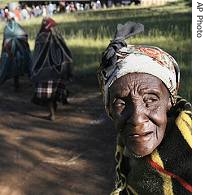2007年VOA标准英语-Lesotho Facing Food Crisis(在线收听)
Geneva
17 June 2007
The World Food Program says the tiny South African country of Lesotho needs urgent international assistance to prevent a major food crisis this year. A report by WFP and the U.N. Food and Agriculture Organization finds cereal prices in Lesotho have skyrocketed after this year's main cereal harvest was ravaged by one of the worst droughts in 30 years. Lisa Schlein reports for VOA from Geneva.

Lesotho women draped in blankets walk to a voting station set in a school in the village of Machache (File Photo - 17 Feb 2007)
The U.N. agencies say they expect the height of the food crisis to hit in the first three months of 2008. They say 400,000 people across Lesotho, or one fifth of the population, will face food shortages and need help.
The agencies say serious food shortages will begin in the next three months. This will affect about 140,000 of the most impoverished people.
A World Food Program Spokeswoman, Christiane Berthiaume, says drought is the biggest problem facing Lesotho. It is responsible for this year's extremely poor harvest, but she says the high prevalence of HIV/AIDS in the country is making a bad situation even worse.
"Thirty-one percent is very, very high and it is obviously undermining the economic resources of the country, resulting in a lack of labor in rural areas," said Berthiaume. "A lot of people are either too weak to work because they are sick or many have died. Those are people that are young people that should be able to work."
Berthiaume notes Lesotho needs about 360,000 tons of food annually. But, because of this year's bad harvest, she says farmers only produced 72,000 tons of cereal. This has resulted in soaring cereal prices that are unaffordable for many people.
She says the World Food Program is preparing an appeal for Lesotho. She says it is crucial that money is available so farmers can buy enough seeds and fertilizer in time for the next crop season. She says another bad harvest next year could be catastrophic.